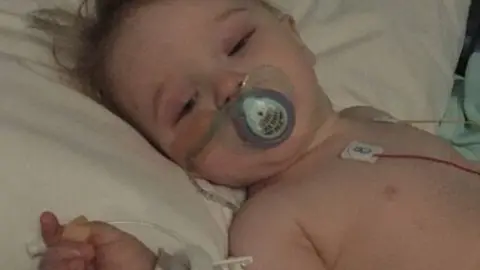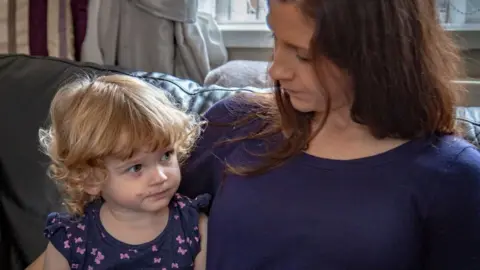'My girl's meningitis was diagnosed as ear infection'
 Other
OtherIt was a Sunday last August and Kirstie Walkden's nine-month-old daughter, Amy, had been out of sorts for a few days.
Worried, she decided to take her to the local accident and emergency unit, where Amy was diagnosed with an ear infection and sent home with some medicine.
Two days later, her condition had worsened. She had a sky-high temperature, was no longer eating or drinking and had gone floppy.
Her mother took her back to the hospital. "All hell broke loose," says Mrs Walkden, 29. "Within an hour, she was placed in an induced coma. She was diagnosed with sepsis and then later peneumococcal meningitis."
It was 18 days before she was ready to be discharged.
 Other
OtherAmy is now doing well - although the family will not know for a few years whether there are any long-term effects.
"It could have been so different," her mother says. "If we had got her to hospital any later, she might not have survived."
'We should have been given more advice'
Mrs Walkden, from the north-west of England, is now backing a plea by the Meningitis Research Foundation calling for more urgency and monitoring to ensure that parents receive the right advice about potential bacterial meningitis and sepsis cases among babies and young children.
"We felt reassured when the hospital told us it was an ear infection," she says. "We were not told to look out for anything else.
"If we had, we might have brought her in sooner."
 other
otherGuidance issued by the NHS advisory body the National Institute for Health and Clinical Excellence (NICE) states the NHS should provide parents with "safety netting" advice if they bring in children with symptoms that could be a sign of meningitis and sepsis.
The conditions can be difficult to spot at first because the symptoms, including a high temperature and vomiting, are similar to those of many less serious ailments.
But a report published by the Meningitis Research Foundation has suggested this safety netting does not always happen.
It cites research from last year that suggests nearly a third of young babies with meningitis receive inappropriate early treatment that delays parents seeking help.
The report includes personal accounts of more than 100 parents, many of whom were sent home with little advice following their first visit to a health professional.
Charity chief executive Vinny Smith says without safety netting advice advice parents can be put off seeking medical attention soon after being seen at hospital or by a GP - but these non-specific symptoms can turn lethal in just a few hours.
"When a child is ill and getting rapidly worse, parents should not be afraid to seek urgent medical help - even if they've already been seen by a doctor that same day," she says.
What are meningitis and sepsis?
Meningitis is an infection of the protective membranes that surround the brain and spinal cord.
It can affect anyone, but is most common in babies, young children, teenagers and young adults.
Meningitis can be very serious if not treated quickly. It can cause life-threatening blood poisoning - sepsis - and can result in permanent damage to the brain or nerves.
The symptoms include:
- a temperature of 38C or above
- being sick
- a headache
- a blotchy rash that doesn't fade when a glass is rolled over it
- a stiff neck
- a dislike of bright lights
- drowsiness or unresponsiveness
- seizures
These symptoms can appear in any order and some may not appear.
The illnesses are sometimes known as meningococcal disease.
In the past decade, there have been between 700 and 1,300 reported cases of meningococcal disease each year in the UK.
Between 5% and 10% of cases result in death.
Of those who survive, 10% to 15% can be left with severe and disabling after-effects such as loss of hearing and sight, brain injury and damage to major organs or loss of limbs.
What do doctors and the government say?
The government in England says it has already taken action. A working group established by ministers has made a number of recommendations to improve care, including that it should be documented in patient's notes when safety netting information has been provided.
The NHS is still in the process of rolling out the recommendations.
The Royal College of GPs also says it has made the issue a top priority in recent years. It has produced a toolkit to help GPs manage and identify cases.
Prof Helen Stokes-Lampard, who chairs the Royal College of GPs, says: "GPs know all too well that meningitis and indeed any form of sepsis can lead to serious complications and in some cases can be fatal, if not recognised and treated in a timely manner.
"But the challenge for all clinicians is that initial symptoms often present in exactly the same way as common viral illnesses such as flu, making both conditions very hard to spot in the early stages of disease.
"GPs are on permanent alert for signs of meningitis in their patients and we do speak to the parents of babies and young children about what they need to look out for which may indicate that an illness could be developing into something much more serious."
